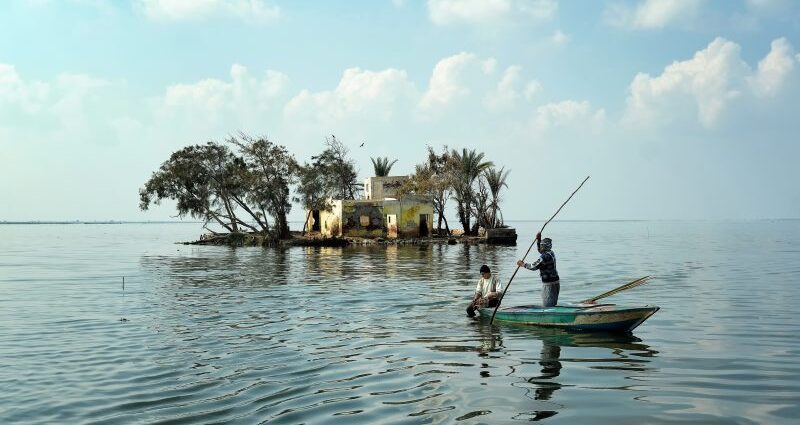A quick search for images from or about Africa on Google often drudges up reductive, cliché and exploitative images of a monolithic continent in perpetual despair.
Wiki in Africa, a South African-based nonprofit founded in 2016, aims to diversify the “single story of Africa” that Nigerian writer Chimamanda Adichie lamented in her renowned 2009 TED Talk, “The Danger of a Single Story.” Their founders asked:
By 2020, Africa’s community of mobile users is expected to swell to 725 million. With so many Africans being exposed to a ‘single story’ about their continent – will they, too, believe that this narrative is true?
To “rebalance the type and diversity of information and perspectives” of Africa online, the organization has hosted a continent-wide photo contest since 2016 called “Wiki Loves Africa,” that encourages photographers to contribute Africa-relevant media to Wikimedia around a particular theme. This year, the theme is transportation — to capture the widest range of images of Africa on the move.
On Wikimedia, with 18 billion page views and nearly 500 million unique visitors each month, there is a dearth of acceptable images of and about Africa. “Most content relating to Africa has been written by editors who have no connection to Africa,” explains Wiki in Africa. In fact, Wikimedia content providers are “disproportionately male, young, and from countries in the Global North.” Half are under 22 and at least 91 percent of Wikimedia editors are male, according to Wikimedia.
Between February 15 to April 15, 1,904 competitors submitted 16,982 media files of Africa-related content from about 53 countries. Top winners received cash prizes based on decisions made from an international jury. These images were viewed approximately 3.1 million times in June 2020 alone.
Here are the award-winning images of Africa on the move in 2020:
First Prize: ‘My Homeland,’ by Mohammed Yousry, Lake Burullus, Egypt
Second Prize: ‘Bread delivery by bicycle,’ by Abd Elhamid Fawzy Abd Elhamid Tahoun, Egypt
Third Prize: ‘A Mess,’ by Summer Kamal Eldeen Mohamed Farag, Alexandria, Egypt
Traditional Culture Prize: ‘Salt transport by a camel train in Ethiopia,’ by Olivier Siret, Lake Asssale (Karum), Ethiopia
Highly commended: ‘Me and You’ by Mohamed Hozyen, Egypt
Highly commended: ‘Busy schedule,’ by Kelly Bissue, Accra market, Accra, Ghana
Highly commended: ‘Crazy horse ride,’ Ewien van Bergeijk, Kwant, Senegal
Highly commended: ‘Khartoum, Africa road tunnel,’ Mohammed Abdelmoneim Hashim Mohammed, Khartoum, Sudan
And a prize-winning video “Le Transport Lagunaire a Abidjan realisé par Bouba Kam’s,” or “Lagoon Transport in Abidjan, realized by Bouba Kam’s,” by filmmaker Aboubacar Kamate:
In addition to overall winners, national teams also identified winners per country.
For example, Team Tanzania announced their winners on Twitter:
Team Tanzania announces their Wiki Loves Africa winners! 1st prize is for A transportation van at sunset by RahimMngwaya; 2nd place goes to Makunduchi, Zanzibar by Erasmus Kamugisha and 3rd to African Sport utility vehicle by Rasheedhrasheed. https://t.co/mpu5P6uCQ4 pic.twitter.com/IcWPFY9GsF
— WikiLovesAfrica (@wikilovesafrica) June 11, 2020
Team Ghana announced their local winners:
Team Ghana has announced the Ghana winners for Wiki Loves Africa 2020. 1st prize to Africa’s Coastal Transport by User:Wisdom Kwesi mensah Abekah, 2nd prize to Train In Accra 004 by User:NanaYawBotar and 3rd to Transport hors gabarit by User:Cyriac Gbogou https://t.co/8dmgbY4djr pic.twitter.com/XJJLzVK0Hs
— WikiLovesAfrica (@wikilovesafrica) June 23, 2020
And Wikimedia Nigeria announced its first prize photo entitled, “Moving upstream”:
@Alaminjos is the overall winner of the just concluded Wiki Loves Africa 2020 in Nigeria with his photo titled, Moving upstream. CCBY-SA4.0. The gift was presented by proxy to one of his friends in Lagos.https://t.co/nXnzqzKFHW@WikiCommons @Wikipedia @Wikimedia @wikilovesafrica pic.twitter.com/0CZLEWkbIc
— Wikimedia Nigeria (@WikimediaNG) July 30, 2020
‘Africa is many things, not just one’
Activists, writers, scholars and photographers have worked hard especially over the last 10 years to diversify content and counter negative narratives about Africa online, but colonial, racist narratives persist through images that dominate with just a few keyboard clicks.
Clearly, Africa is not just its despair, but it is also not just its riches — or its past. When American singer Beyoncé recently put out her visual album, “Black is King,” there was major backlash over its reductive representations of Africa that perpetuate narrowly imagined fantasies of the continent.
South Africa writer Pababllo Chauke takes issue with this “corrective representation,” or — “showing Africa solely as ‘better off’ through a capitalist lens.” In his essay, “Black is not king, queen or peasant — black is complex,” Chauke writes:
Africa is many things, not just one: We need to treat it with complexity.
“Motherlandization” is the term Chauke uses to describe the “process, conscious or subconscious, overt or covert, intentional or unintentional, by African Americans to romanticize and reduce Africa to a monolithic, frozen and fixed ‘motherland’ that serves their views. They treat Africa as a repository for their use and consumption,” he writes.
By encouraging submissions of more diverse open-source photos of Africa in all its complexity, Wiki in Africa hopes that:
[T]ruthful information, correctly placed on a platform that is open and accessible to all, can fundamentally change how people both within and outside Africa view and interact with the continent.
